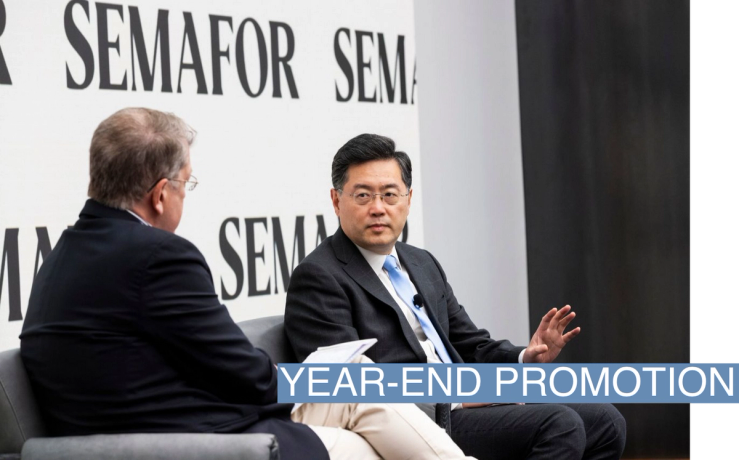The Scoop

China’s Ambassador to the United States, Qin Gang has been appointed as his country’s next foreign minister, Chinese state radio confirmed Friday. The news was first reported in Semafor.
In this article:
Steve’s view
The White House snubbed Qin for most of his time in Washington, but has been scrambling to open doors to him since realizing that he was on the cusp of emerging as a key player in Beijing. He’s recently had sitdowns with Treasury Secretary Janet Yellen and Secretary of State Antony Blinken, who I’m told worked to make a real personal connection while meeting in his office at the State Department.
Qin’s ascension may mean tougher reactions to episodes like Taiwan trips by senior U.S. officials (Speaker Nancy Pelosi’s trip was a sore point during his tenure) but overall a more informed and nuanced diplomatic tone in U.S.- China relations. It also potentially signals Beijing’s interest in reaching out more actively to the wider world in ways that could narrow America’s global options and leverage.
Though he himself rejects the label, Qin is seen by many as one of China’s “wolf warrior” diplomats who’ve taken a more aggressive stance on the global stage, in some cases openly berating and mocking foreign powers, both in meetings and on social media. Their hawkish rhetoric has intensified in tandem with China’s willingness to flex its military muscle, including by running extensive armed forces exercises and launching missiles close to Taiwan.
Qin recently took a swipe at President Joe Biden’s foreign policy rhetoric in an op-ed for The National Interest, writing that if “people choose to see the world from a ‘democracy vs. authoritarianism’ perspective, they will very likely usher in a world of division, competition, and conflict.”
However, Qin’s brand of diplomacy is also considered more nimble and subtle compared to his wolf warrior peers within the diplomatic pack, and he has expressed openness to working alongside the U.S. on key issues such as climate. (His National Interest op-ed stressed that “China-U.S. relations should not be a zero-sum game”). Amid the tensions of Speaker Pelosi’s Taiwan visit, Qin kept open the lines of communication with the White House.
He also likes to use a touch of soft power; he’s shot free throws at a Wizards NBA game, thrown the first baseball at a Cardinals game, driven tractors on farms he visited around the country, and had his chef build a giant Great Wall of China for the State Department’s gingerbread competition.
“Qin Gang is a smart alpha, not an alpha alpha,” one person I spoke to within China’s Ministry of Foreign Affairs told me.
Step Back
The speed and trajectory of Qin’s rise within the Chinese Communist Party is in some ways unprecedented, and reflects his closeness to President Xi Jinping. Most of China’s diplomats work their way up through the regional departments in China’s sprawling and regimented foreign ministry. Qin took a different track, serving as the ministry’s chief of protocol, a position in which he oversaw much of Xi’s interactions with U.S. and other global leaders.
Much of the job involved overseeing ceremony — deciding the venues for major events and deciding who sat where — learning first-hand what Xi’s preferences were, how he thought and reacted to leaders, and what his driving passions were. At the ruling party’s most recent congress, Qin became the first former chief protocol officer ever appointed to the powerful Central Committee. “Leader Xi trusts him,” said the foreign ministry source I spoke with.
His relationship with Washington has been frosty at times, but has recently undergone a bit of a thaw in recent months as the Biden administration has tried to calm tensions with China.
The White House kept Qin at arms length when he first arrived in DC during 2022, blocking him from senior-level meetings and policy discussions — or even schmoozing — with any branch of federal government. Kurt Campbell, a deputy assistant to the President acknowledged to be Biden’s czar of Indo-Pacific policy at the National Security Council, had a confrontational meeting with Qin in which Campbell said the time for “cooperation” between the countries was over and that this was now a time for “competition.” (You could say America assigned its own wolf to meet another)
But after President Biden’s meeting with Xi in Bali, which many credit with diffusing growing pressure in the relationship over Taiwan and human rights concerns, U.S. intelligence assessed that Qin would likely be elevated to foreign minister. After that point some of the highest level doors in the U.S. government began to open, leading to facetime with Yellen and Blinken.
I have formally interviewed Qin twice, once for Al Jazeera and again recently at Semafor’s Africa Summit. Both times he outlined China’s qualms with the U.S. on controversial issues such Taiwan, competition over technology, and human rights. But he also laid out opportunities for “win-win partnerships” between China and the U.S. on climate, trade, mutual business interests, and other tracks.
During our Africa Summit chat, Qin gently reminded the audience that China doesn’t plan to cede any of its global influence. He pointed out to me that China’s foreign minister traditionally travels to Africa in January as their first foreign trip of the year, in order to underscore the continent’s place as the “bedrock” of Beijing’s foreign policy. In 2023, the trip will have special significance, taking place just a month after Biden hosted the leaders of 49 African nations in Washington in an effort to assert more sway over the region.
In my Al Jazeera interview with him, Qin tried to frame America’s relationship to China with an analogy to the musical “Hamilton.”
“Burr lamented what he had done killing Hamilton and said maybe there was room enough in the world for both Burr and Hamilton,” he said. “Maybe there is room enough in the world for both China and the U.S.” What Qin didn’t tell me was whether he saw China as Burr or as Hamilton.
Notable
- In a remarkable set of podcasts and deep investigative journalism, The Economist’s Sue-Lin Wong offers an 8-part podcast series titled “The Prince: Searching for Xi Jinping.” She lays out the pathway to power for Xi and those who have risen with him. And she outlines how embers of choice and liberalization have been snuffed out as Xi consolidated power, became more assertive domestically and globally, and instituted new CCP scaffolding that Chinese communist doctrine is a function of Xi’s own views.

